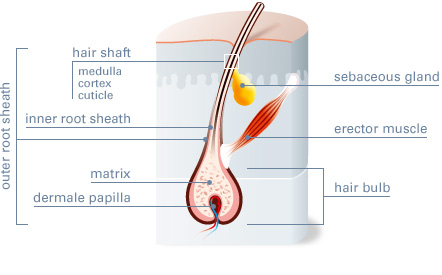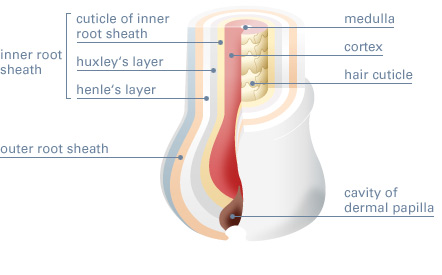Hair structure
A hair is a flexible keratin thread about 0.1 mm thick, with great strength and elasticity.

The hair follicle
the hair bulb
the inner root sheath
the hair shaft
New hair is made inside the onion-shaped hair bulb that lies within the hair follicle. It has a cavity in which the dermal papilla is embedded. New cells are continuously produced in the lower part of the bulb. As they grow and develop they steadily push the previously formed cells upwards. Special cells in the hair bulb produce the pigment that colors hair. The pigment is called melanin.
The sebaceous gland is situated in the upper follicle, as is the erector muscle of the hair.

The bulb contains the hair matrix, the germ layer that forms the inner root sheath, and the hair shaft that is composed of three layers: medulla, cortex and cuticle
THE HAIR BULB
The hair bulb is a structure of actively growing cells which eventually produce hair. Cells continually divide in the lower part of the bulb and push upwards, gradually hardening. When they reach the upper part of the bulb they arrange themselves into six cylindrical layers.
The three inner layers become the hair, made up of the cuticle, the cortex and the medulla – although the medulla isn’t always present, especially in hairs with a thinner diameter. The outer three layers become the lining of the follicle and form the inner root sheath and basement membrane, around which lie undifferentiated cells. Specific cells in the hair bulb, called melanocytes, make the pigment called melanin that gives your hair its colour.
HAIR SHAFT
Your hair shaft is the part of your hair that can be seen above your scalp. It’s made of a protein called keratin, compacted and cemented together. Keratin is a remarkably strong protein, which is very resistant to wear and tear. It is in fact the same material that feathers, claws, nails and hoofs are composed of! Keratin is a sulphur-rich protein, with strong disulphide bonds holding the protein strands together. This plays an important role in any chemical processing like perming and relaxing, as these break disulphide bonds and reset them to a different configuration to change the shape of your hair.
Your hair shaft also consists of hydrogen bonds, which help to give your hair its flexibility. They are weaker and more numerous than disulphide bonds and are easily broken with the application of water. This is what allows you to temporarily change the natural configuration of your hair with heated styling aids after washing.
Your hair shaft consists of three layers:
THE CUTICLE
A protective layer composed of overlapping cells, like fish scales or roof tiles, but facing downwards. The outer cuticle holds your hair in your hair follicle by means of a Velcro-like bond. It also minimizes the movement of water (moisture) in and out of the underlying cortex. However, chemical processes and weathering can lift the cuticle and disrupt this balance. When healthy, i.e. smooth and intact, your outer cuticle gives your hair shine and protects the inner layers from damage.
THE CORTEX
Forms your hairs’ main bulk and pigment (colour). It consists of long keratin filaments, which are held together by disulphide and hydrogen bonds. The health of your cortex depends largely on the integrity of the cuticle protecting it.
THE MEDULLA
If present, this cosists of a thin core of transparent cells and air spaces.


